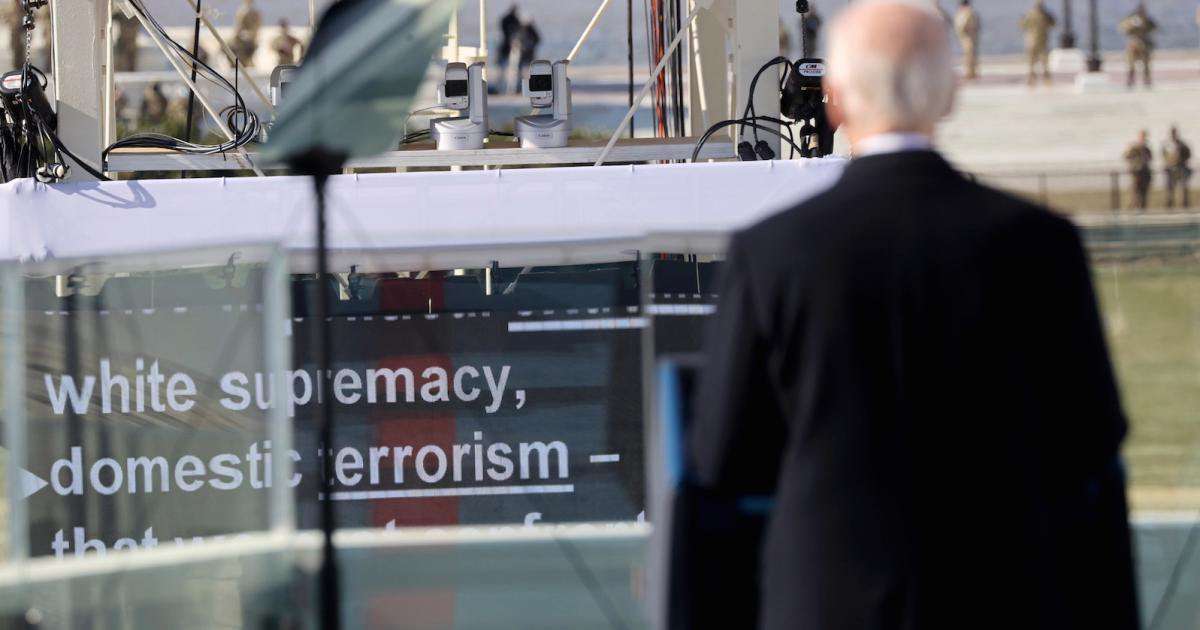Race played an important role in US president Joe Biden’s inaugural speech on Wednesday.
Speaking of the issues that the country now faces, Biden alluded to this summer’s Black Lives Matter protests, citing “a cry for racial justice, some 400 years in the making,” and adding, “The dream of justice for all will be deferred no longer.” He decried “the sting of systemic racism” and the ways that racism has shaped the US, saying, “Our history has been a constant struggle between the American ideal that we’re all created equal and the harsh, ugly reality that racism, nativism, fear, demonization have long torn us apart.” He referenced Abraham Lincoln’s Emancipation Proclamation, issued in 1863. And in a particularly noteworthy moment, Biden cited a “rise of political extremism, white supremacy, [and] domestic terrorism that we must confront and we will defeat.”
Biden is not the first US president to discuss racism in his inaugural address. In Barack Obama’s first speech as president, he observed that “a man whose father less than 60 years ago might not have been served at a local restaurant can now stand before you to take a most sacred oath.” President George W. Bush in 2005 and president Bill Clinton in 1997 both acknowledged the persistence of racism in the US.
But Biden is the first to specifically acknowledge the existence of white supremacy. That’s an important sign of the way that the popular understanding of racism in the US has evolved in recent years, and of how Biden may approach racial inequality in office.
As the New York Times explained last fall, for the past few decades, the American mainstream media was more likely to reserve the phrase “white supremacy” to describe Nazis or the Ku Klux Klan—hate groups that claimed their own bigotry and had an explicit agenda to kill and/or oppress people of color and Jewish people.
But over the past 10 years, influential people like writer Ta-Nehisi Coates and activist-athlete Colin Kaepernick have helped to not only popularize the term, but to broaden its application to refer not only to those who explicitly embrace white supremacy. In the current parlance—and particularly in the wake of the widespread discussions about racism that began last summer—white supremacy is understood as a force enacted through systems and institutions that benefits white people while oppressing non-white people, evident in everything from the US legal system to the way corporations hire.
White supremacy is particularly useful as a term that encapsulates the ways racism can be reinforced independently of individual prejudice. “People have this misconception that [white supremacy] has something to do with hate or racial animus, and it doesn’t,” journalist Michael Harriott explained in an interview last summer. The fact that majority-white schools have more funding than majority-Black schools, or that Black people are disproportionately more likely to be shot and killed by police, are illustrations of white supremacy in action.
Biden’s predecessor, president Donald Trump, opposed the idea that systems in the US work to further inequality. Trump said last year that teaching students about systemic racism was “a form of child abuse” and, in an executive order intended to restrict diversity training, accused educators of peddling the “false and pernicious belief that America is an irredeemably racist and sexist country.”
The racial justice movement does indeed hold that America is a racist country—but not irredeemably so. Biden’s use of the term white supremacy is meaningful because it signals that the new US president understands that ending racial inequality will require confronting the many ways it manifests in the country’s institutions. Appointing the most racially diverse cabinet to oversee those institutions in history is a good place to start.

Oozy0rifice on January 21st, 2021 at 18:21 UTC »
Conservatives unironically: Oh nooo he's coming after us!
Jump_Yossarian on January 21st, 2021 at 18:06 UTC »
Biden never said trump’s name but RW talking heads are outraged that Biden went after “trump supporters”.
Kind of like Fox News calling “no fascist USA” graffiti “anti-trump”. Outing themselves.
Dano-D on January 21st, 2021 at 18:06 UTC »
And Rand Paul got butthurt.